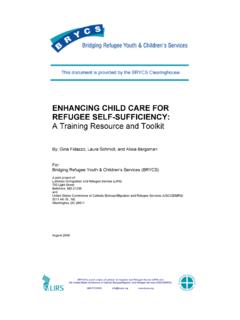Transcription of Refugee Children in U.S. Schools: A Toolkit Teachers …
1 Refugee Children in Schools: A Toolkit for Te a c h e r s and School Personnel Tool 5: Federal Requirements to Provide Interpretation/Translation in the Schools Refugee Children in Schools: A Toolkit for Te a ch e r s and School Personnel BRYCS is a project of USCCB/MRS and is supported by the Department of Health and Human Services, Administration for Children and Families, Office of Refugee Resettlement. Grant No. 90 RB 0022. To access the entire Toolkit , visit: Interpretation FAQ-Page 1 Federal Requirements to Provide Interpretation/Translation in the Schools A Refugee child from Burma was struggling in school. Her teacher looked forward to parent-teacher conferences because she wished to speak with the child s parents. Invitations and reminders were sent out to all the parents, but only in English. The parents did not understand the letters and therefore missed the meeting.
2 The teacher managed to arrange another meeting with them, but when they showed up, there was no interpreter and no way for them to communicate with her. They fumbled through the meeting the best they could with gestures and simple English, but the parents left frustrated and having understood very little of what was said to them. Interpretation/Translation Interpretation refers to the process of orally rendering communication from one language into another, while translation refers to the same process in written language. Therefore, in the example above, a translator was needed to translate the parent-teacher conference invitation, but an interpreter was needed for the actual conference. Challenging interpretation/translation situations like the one described above happen throughout the every single day; however, these may be violations of federal law.
3 The following pages describe federal requirements related to interpretation/translation in the school setting. National Origin Discrimination Before specifically discussing interpretation and translation, it is important to have a basic understanding of federal laws and regulations related to national origin discrimination such as: title VI of the Civil Rights Act of 1964: This prohibits discrimination on the basis of race, color, or national origin in programs and activities that receive federal financial assistance. Executive Order 13166, Improving Access for Persons with Limited English Proficiency (2000): This order does not create new obligations, but rather clarifies existing title VI responsibilities. It discusses what constitutes reasonable steps to ensure that clients in federally funded programs have meaningful access to the information and services provided and looks at four factors: 1.
4 The number or proportion of LEP persons to be served 2. The frequency with which LEP individuals come in contact with the program 3. The nature and importance of the program, activity, or service to people s lives 4. The resources available to the grantee/recipient and costs More information about these can be found on the Federal Interagency Working Group on Limited English Proficiency s Web site. Ron Tech 2000 Interpretation FAQ-Page 2 Non-Discriminatory and Comparable Access to Education The following policy memos and case law have to do with national origin discrimination in the school context. They provide national origin- and language-minority students with non-discriminatory and comparable access to education: 1970 Memorandum: This federal memorandum on Identification of Discrimination and Denial of Services on the Basis of National Origin clarified the title VI requirements of school districts to provide equal educational opportunities to all Children , regardless of national origin and language.
5 Lau v. Nichols (1974): The Supreme Court upheld the requirements articulated in the 1970 Memorandum as a valid interpretation of the requirements of title VI. Two additional policy memos related to discrimination on the basis of national origin in an educational setting were issued in 1985 and 1991. These provided more clarity on school districts requirements in servicing ELL students and providing language assistance. Specific References to Interpretation/Translation It is important to note that the school-related federal laws and regulations mentioned above do not explicitly use the words interpretation and translation but rather indirectly address these topics within the context of providing students with non-discriminatory and comparable access to education. The 1970 Memorandum provides the most specific guidance on interpretation, but still does not specifically use that word.
6 It states: School districts have the responsibility to adequately notify national origin-minority group parents of school activities which are called to the attention of other parents. Such notice in order to be adequate may have to be provided in a language other than English. This is reiterated in The Provision of an Equal Education Opportunity to Limited-English Proficient Students, under the Department of Education Office for Civil Rights (DOE/OCR) list of title VI Compliance Issues. DOE/OCR addresses complaints related to the issue of meaningful communication with LEP parents in a manner consistent with Executive Order 13166, Improving Access for Persons with Limited English Proficiency (2000).1 The Elementary and Secondary Education Act ( No Child Left Behind )2 also does not specifically use the words interpretation and translation, but rather outlines the following information that must be provided to the extent practicable, in a language parents can understand : title I: Improving the Academic Achievement of the Disadvantaged3 o Information regarding achievement on academic assessments.
7 O Annual state and local educational agency report cards. o Parents Right-to-Know (professional qualifications of their child s Teachers , notice that the child has been taught by a teacher who is not highly qualified, etc.).4 o Information in the school s title I o If the child s school is identified for school improvement, 6 information on what this means, the reasons for the identification, what the school district and state are doing to address the problems identified, how parents can become involved to help, and an explanation of the parents right to transfer their child to another o Information on the availability of supplemental educational services, identified approved providers, and a brief description of the services. For students receiving supplemental educational services, information on their o Information related to school and parent programs, meetings, and other activities and notification of the district s parental involvement policy.
8 Interpretation FAQ-Page 3 o Meaningful consultation with parents of title I participating Children on the planning and implementation of parental involvement programs, activities, and title III: Language Instruction for Limited English Proficient (LEP) and Immigrant Students o The reasons the child has been identified as LEP and is in need of a language instruction educational program, the child s level of English proficiency and academic achievement, information about the various program options (methods of instruction used, how the programs differ, how the programs will help their child learn English, etc.), and information about a parent s right to decline to enroll their child in such a The Individuals with Disabilities Education Act (IDEA) contains a number of references to interpretation and translation. IDEA makes it clear that communicating with non-English speaking parents about special education demands the highest standards in regards to interpretation and translation.
9 IDEA states: Assessments and other evaluation materials used to assess a child must be provided and administered in the child s native language, unless it is clearly not feasible to do All parents of a child with a disability are to be provided with written notice before the school proposes to initiate or change the identification, evaluation, or educational placement of the child. This written notice must be provided in the native language of the parent, unless it is clearly not feasible to do so. If the native language is not a written language, the school must ensure that the notice is translated In general, parents are strongly encouraged to attend Individualized Education Program (IEP) team meetings. The school must take whatever action is necessary to ensure that the parent understands the proceedings of the IEP Team meeting, including arranging for an interpreter if When consent is sought (for accepting special education services, etc.)
10 , the parent must be fully informed of all information relevant to the activity for which consent is sought, in his or her native language, or other mode of The State Educational Agency must inform parents about their right to confidentiality of personally identifiable information. This notice must be given in the native languages of the various population groups in the What to Do If Federal Requirements Are Not Met If you have a concern regarding interpretation/translation or are aware that national origin- or language-minority students are not being provided with non-discriminatory and comparable access to education, consider taking the following steps: Request a meeting with school administrators and/or your local school board. Refugee resettlement and/or community based organization staff might consider offering the school district assistance in locating interpreters, but be clear on roles and responsibilities.




